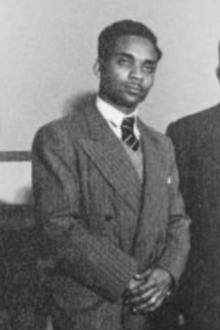Henry Gunter | |
|---|---|
 | |
| Born | 1920 |
| Died | July 23, 2007 (aged 86–87) |
| Nationality | Jamaican/British |
| Citizenship | United Kingdom |
| Occupation(s) | Machine operator, tool cutter, trade unionist |
| Organization(s) | Amalgamated Engineering Union. Afro Caribbean Society |
| Known for | Black civil rights leader. Communist activist. Trade union activism. |
| Notable work | A Man's A Man (1954) |
| Political party | Communist Party USA (CPUSA) Communist Party of Great Britain (CPGB) |
Henry Gunter (1920 – 23 July 2007) was a leading British communist and civil rights leader, most famous for his campaigns for racial equality in the English city of Birmingham. After joining the Communist Party of Great Britain (CPGB), he authored a report titled A Man's a Man (1954), a key British anti-racist text published by the CPGB.[1][2][3] He also authored numerous articles exposing racism in Birmingham's hotels, housing, and employment.[1] Gunter also helped create the Birmingham branch of the Caribbean Labour Congress, and later served as the leader of the Afro Caribbean Society, which he used to end racial segregation in the employment of Birmingham city's bus services.[4] As an influential trade union leader, Gunter was the first black man to serve as a delegate for the Birmingham Trades Council,[2][5] and he forwarded a successful motion to the Trades Union Congress in support of the rights of immigrant workers.[1] He dedicated his entire life to both trade union activism and fighting for the equal rights of black people.[1][4]
- ^ a b c d Meddick, Simon; Payne, Liz; Katz, Phil (2020). Red Lives: Communists and the Struggle for Socialism. UK: Manifesto Press Cooperative Limited. p. 78. ISBN 978-1-907464-45-4.
- ^ a b Searle, Kevin (2008). "'Race' and Racism in Birmingham: Researching Post-war Archives" (PDF). Connecting Histories. Retrieved 14 May 2021.
- ^ Tate, Fiona. "Faces and Places: Henry Gunter". Connecting Histories: Staffordshire County Council. Retrieved 14 May 2021.
- ^ a b Birmingham Mail (4 September 2007). "Tribute paid to tireless activist". Birmingham Mail. Retrieved 14 May 2021.
- ^ Conduit, Susan (2017). A Cultural Study of two-tone in the Socio-Political and Economic Context of the 1970s (PDF). University of Central Lancashire. p. 28.
